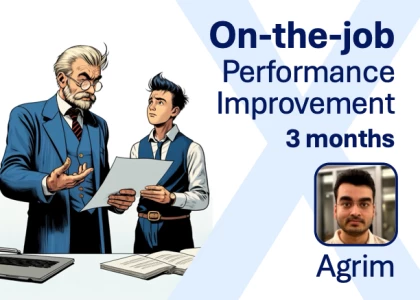Lets say you do a case with a partner and you do another case with a coach. Will you say one case with a coach is equivalent to 5,7 or 10 cases with partners who also learning. Because I assume with a coach, he or she knows what the issues are , the feedback, the kind of questions you get asked.
Case partners


Hi there!
I don’t know if the math relation is what differentiates professional coaches from regular partners. If you have a partner whose performance is an average one, you may do 100 cases with this person and the progress will be… well, average.
A coach will help you quickly identify your main strengths and gaps, will tell you exactly what you should do to address them and teach you approaches that work, since they have been both candidates as well as interviewers. Also, they will provide you means to keep progressing without them. Of course, there are good partners that may elevate your performance, but unfortunately they are not so common.
So to keep the comparison exercise, I would say that a partner is like a gym buddy, while a coach is a personal trainer :)
Feel free to DM me if you wonder if coaching is for you. I offer a 20min free alignment call, happy to book a slot for you.
Best,
Mari

Hi!
The partner and the coach will have some pros and cons:
Coaches:
- Help with actual case prep e.g. does, don't, structures, approach etc.
- Good for guided advice
Partners:
- Good for "real-life" practice
- Good to practice pacing/ "FIT" questions
First, I'd make sure I do enough Coaching sessions to ensure you are actually prepared and know how to do a case well.
Secondly, I'd practice cases with the Partner.
Happy to chat!

Casing with a coach gives you targeted, experience-based feedback that helps you identify blind spots, improve faster, and simulate the intensity of a real interview. They know what interviewers listen for and can push you beyond surface-level performance.
Casing with peers is still valuable for building consistency, trying different styles, and improving your comfort with the format — but the feedback is often limited by their own experience level.
Both are important, with coach-led sessions generally bringing more depth and acceleration to your learning.

No, it doesn't work like that.
A (good) coach knows "what good looks like". Can explain you precisely what you are doing wrong and give you actionable advice on how to improve. This means that you may do 10 cases with peers and still not get the value you get from a (good) coach.
Of course, if the coach is just doing interview simulations and giving you feedback at the end, it won't be much better than a peer. You still get the advantage of training with (hopefully) an experienced interviewer, but that's it.
But if a coach is mentoring you, is using a "stop and go" approach such as the one I use. If is experienced enough and can explain you what a good approach or answer is, what materials to use, how to shift your mindset, how to develop a structured answer or approach certain types of problems... that's the kind of support you won't be able to get with a peer. And, not the least, a coach knows where the bar is and what is the difference between a good performance and an average one. A peer who is still learning won't be able to do this.
______________________________________________________________________________
Consider this example. You are learning tennis. A spectator (or amateur opponent) may easily spot when you are doing mistakes, but that doesn't mean they know WHY nor that they are able to tell you HOW to do it the right way. E.g. how to hold or spin the racket.
I knew people who had played table tennis for years... and couldn't do a spin (or defend against one) because they only played with other peers at the same level. And then they meet someone who not only knows how to do it but is able to explain how to do it, and in the same day they learn how to spin - and then can practice with peers for a while to improve their game.
With case practice it's the same. It helps a lot to have someone explaining you what is a good answer and how to come up with one. THEN you practice with peers and you improve. But just by practicing with peers there are a lot of things you won't be able to learn.
Having said this, giving a case to 5 different people and seeing how they come up with different valid approaches and ideas is a very valid learning experience!

Hey there 😊
That’s a great question — and you're right in thinking that doing a case with a coach can feel way more impactful than with a peer. A single case with a good coach can honestly be worth 5–10 cases with other candidates, because of the targeted feedback, real-time correction, and deep insights into what interviewers are really looking for.
Personally, I usually offer one coaching session to start — and then I equip you with the tools, structure, and mindset so that you can practice independently and effectively afterwards. That way, you don’t need to rely on dozens of random partner cases to improve — you’ll know what to focus on and how to sharpen your performance strategically.
Let me know if you'd like to give it a try 😊
Best,
Alessa 🌟

Hi there,
You are approaching this from the wrong end...
The key reason why candidates fail their case interviews and don't improve with practice is because they never learn the right approach and techniques to begin with.
They might go through 30-40 cases, just repeating the same mistakes over and over again with different people and different problems. There is no strong baseline.
Make sure you understand and learn the basics for each part of the case (structuring, charts, math), which is
A replicable step-by-step for each part of the case interview
The right thinking techniques around the individual parts (e.g., what's a framework, what is evaluated, how can I ensure I think about it the correct way, what are some shortcuts to get to the answer quickly, etc.)
Simple communication templates to help you communicate your insights as well as ask for data in the right way to drive the case forward
Hiring a skilled coach with a track record of success will give you that baseline. Practicing 20 interviews with other candidates will not.
Quality > quantity all the way.
Cheers,
Florian














